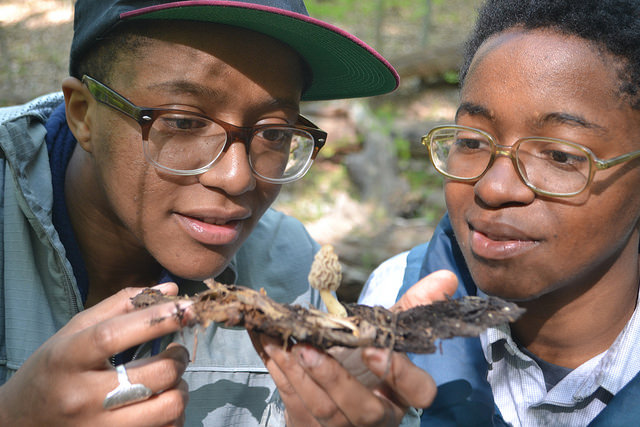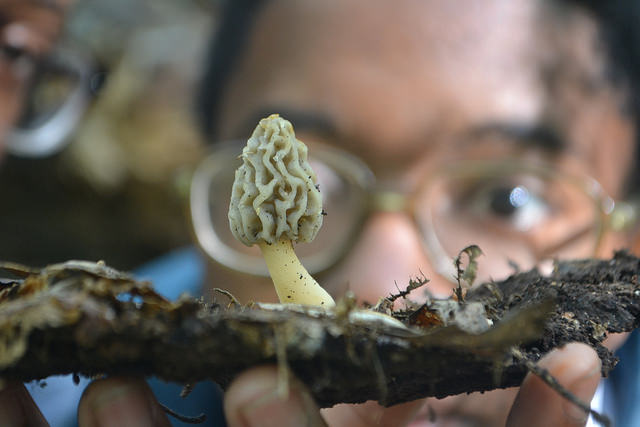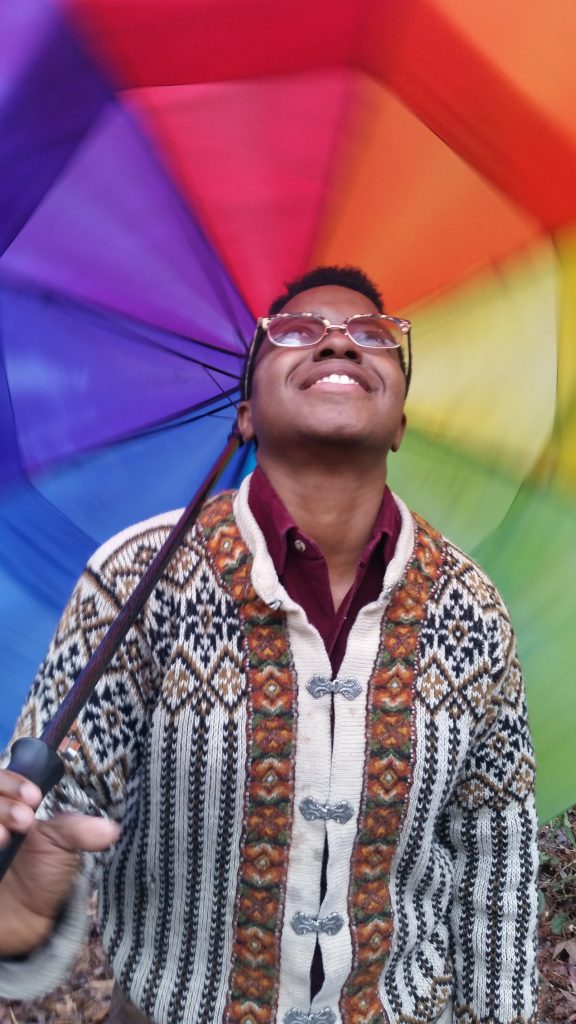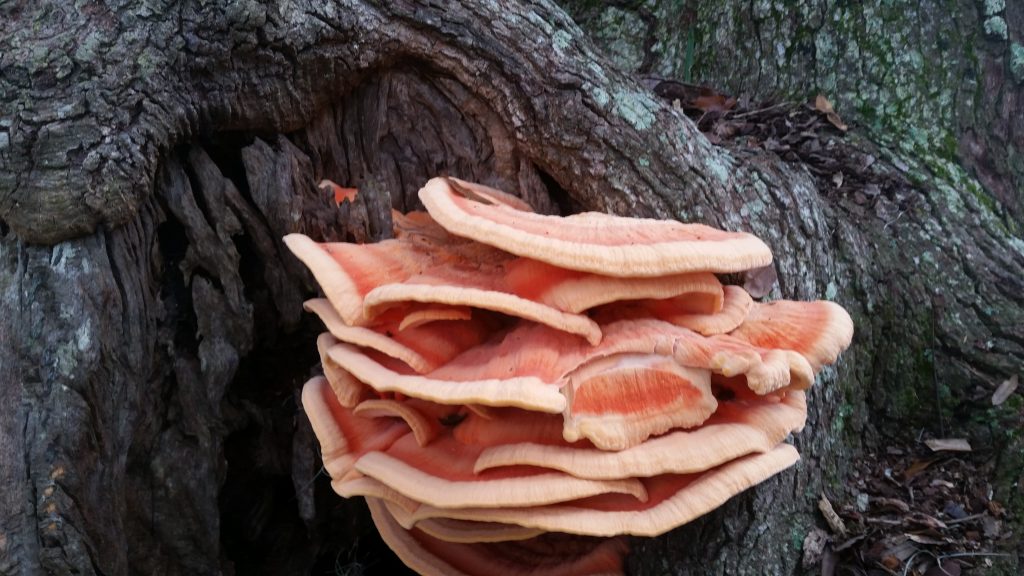Have you ever really explored the inside of a mushroom? If you haven’t, hop on over to Good Sense Farm’s Instagram account. The feed is full of gorgeous pictures of brightly colored mushrooms, blooming in fabulous textures and patterns. They seem like surreal landscapes or bizarre deep-sea creatures. The sumptuous gills of the pink oysters are particularly enticing. Zachari Curtis has always been drawn to them and made it their job to learn how to grow and sell them.
The mystique of these organisms apparently inspired caution in Zachari’s father, an avid forager. Their father, a retired military man, taught his children all about the local plants and berries that would be suitable to take home for dinner; he and Zachari’s mother are extremely knowledgeable about indigenous flora and generous with that information. Zachari and their sibling certainly inherited those loves of food and being outdoors from their parents. While stomping around their grandmother’s farm in North Carolina, they hunted for all types of plants. However, the children were never allowed to touch the intriguingly soft mushrooms that grew all around them. They seemed mysterious, popping up in unexpected places with luxurious folds of spongy something. Because mushrooms were always, in a sense, off the table, Zachari nourished a fascination with them that persisted until today, almost two decades later. “I had a weird curiosity about something that seemed forbidden,” they mused.
Zachari now owns Good Sense Farm where mushrooms and bees are lovingly cultivated for farmers markets in the DC area. They had their first hands-on experience with ‘shrooms at a farm where they trained as an apprentice. That “weird curiosity” was satisfied in the mushroom house, where they learned how to properly care for types like shitakes and king oysters. The fungi that Zachari’s father had been nervous about was fully embraced there, and taboo become inspiration, which Zachari would use to create Good Sense Farm in 2013.
“To be an urban farm means you have access to people. You’re so much closer to customers.”
Zachari knows that many people are skittish when it comes to mushrooms, so they are working to introduce gourmet types into the diet of their local community. “We didn’t have that much production in the first couple years,” they said. “What we did was throw parties and we cooked with our food.” Zachari knows that, though their product might be one that many local folks haven’t encountered before, Good Sense Farm is well positioned to acquaint their community with gourmet mushrooms. “To be an urban farm means you have access to people. You’re so much closer to customers.” Zachari knows just how to harness that social connection to get the word out.
Good Sense Farm has hosted a number of community events, including SporePrint, a farm-to-table dinner series. The meals served as a way to showcase the varied and delicious ways that customers can cook mushrooms in their own homes, and to get them excited about Zachari’s locally produced mushrooms. Zachari was able to work with their sibling Curt, a gifted chef like their mom, to create a menu that exhibited everything the farm has to offer.
The dinner also served another purpose: helping Good Sense Farm promote other local farmers of color. They proudly advertised that one hundred percent of food used in SporePrint was sourced from other local farmers of color. It’s a matter that Zachari is passionate about. They are the cofounders of a collective, Community Farming Alliance, that promotes products by women farmers and farmers of color. CFA started out with just Zachari and Gail Taylor of Three Part Harmony Farm, but has grown to three other active farms and five affiliate farms. All of them are run by people of color or women farmers.
Zachari met Gail at a farm where they were both apprentices. They share a background in community organizing and a commitment to helping their local community thrive. To do that, Zachari acknowledges that they need each other’s help. When they were each starting, they felt surrounded by a supportive community of other farmers, “But also there were things missing as far as understanding how the system works differently for farmers of color, women, and non gender conforming people. I don’t think that we could have been farmers just trying to do it the same way as folks with privilege do,” Zachari says. The two farmers knew that: “in order to survive, you have to work together economically and politically.” From these notions of shared obstacles and intentions, the Community Farming Alliance was born.
The beginnings were humble, but effective: “It’s been a process of figuring out what works for us,” Zachari says. “We started out buying supplies together which seems really basic, but when you have to pay shipping for four different orders and you can just pay for one, those couple of dollars add up.” The farmers involved are all excited to promote each other’s products. They recognize the importance of working together against odds that might not be in their favor. They support each other when people don’t believe that they could be the owners of their own businesses, or when they’re turned down for renting a plot of land. Solidarity has been just as important in CFA as the financial help. The farmers assert that there should be more conversation about the role that privilege plays in this field because folks “don’t really talk about the networks of either privilege or collaboration that support being successful or not.” As a group, they’re working to change that.
Zachari has found a buzzing hive of likeminded people in DC. Having grown up there, “I have people who have known me since I was a child, and they are very supportive. Including the people who don’t really understand what I’m doing.” For Good Sense Farm, community is everything. Though beginning a farm anywhere is tough work, Zachari has found a supportive group in DC. It seems that there is a thirst in the city for Good Sense Farm’s products, be it honey or change in the local food movement.







